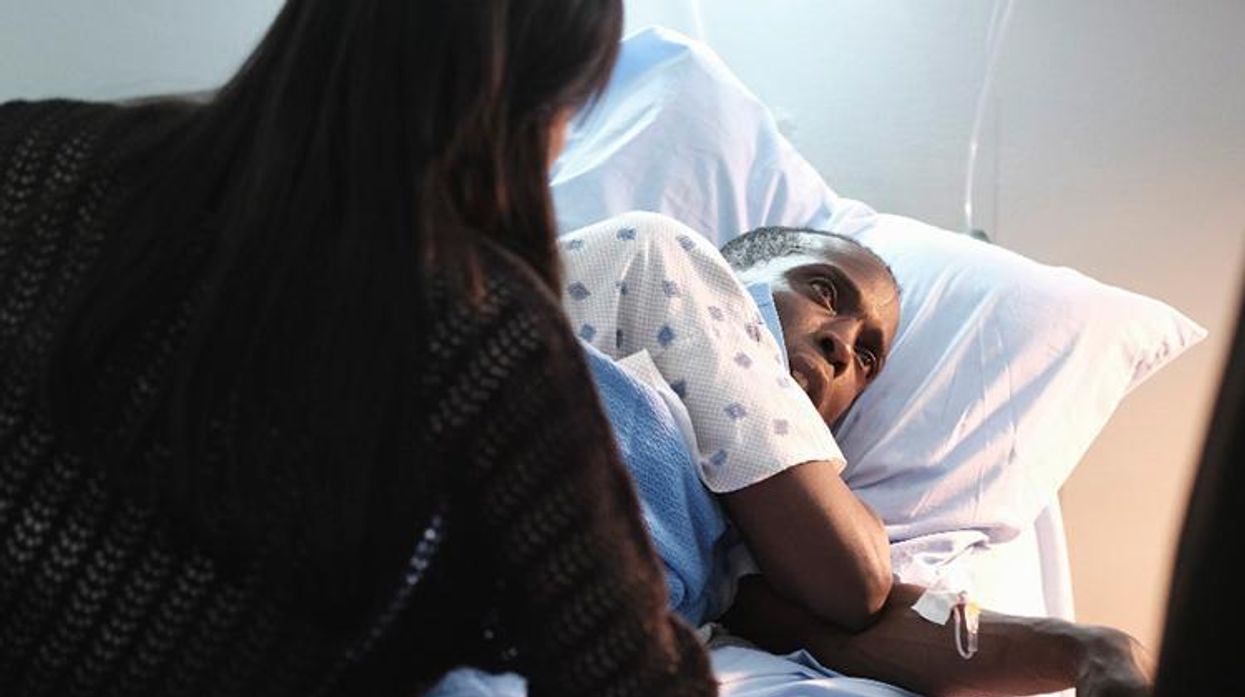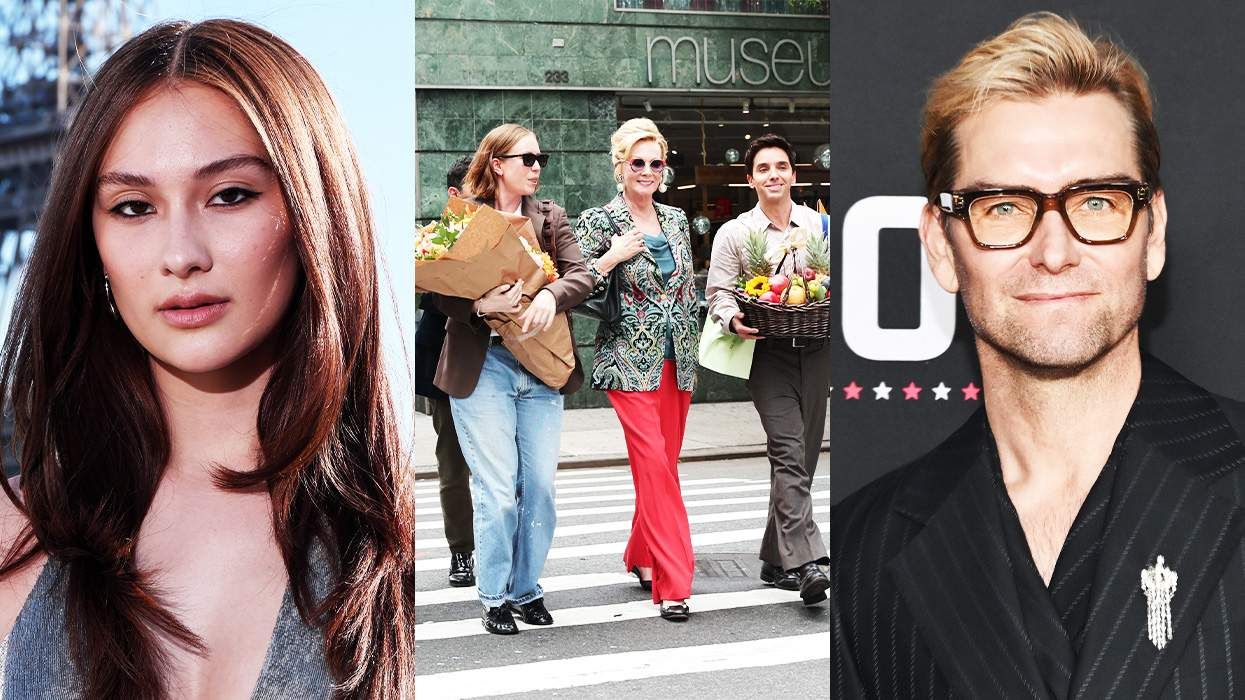Gay activist Cleve Jones (Guy Pearce), speaking to a reporter in When We Rise, says, "Each generation has its own epic confrontations it must face." The message is clear: You're fighting a battle, dear viewer. But it's a battle that's been fought before. And it's one that will be fought again.
Throughout the week, ABC will be airing episodes of the miniseries created by Dustin Lance Black (Milk), which depicts decades of recent LGBT history. There are many lessons to learn. And during the presidency of Donald Trump, who has already begun to attack transgender rights, learning them may be more essential than ever.
To this end, The Advocate discussed each episode with Black, asking the gay director and writer what LGBT viewers -- and Americans more broadly -- should take away from each "epic confrontation" that has taken place since a trans woman threw the first brick at the Stonewall Inn in 1969.
[RELATED: "When We Rise Part One: When Riots Are the Only Answer"]
Night three of When We Rise begins in 1992 with a casting change: a new set of actors in the roles of Cleve Jones (Guy Pearce), Roma Guy (Mary-Louise Parker), and Ken Jones (Michael K. Williams). That these actors are older and more seasoned seems appropriate, as these activists, after weathering the worst of the AIDS crisis, have also been aged by time, experience, and hardship.
At this juncture, both Ken and Cleve are living with the virus, which presents not only health difficulties but also systemic hurdles. Ken is a veteran of the Vietnam War, but his access to care is limited due to antigay policies in the military. When his partner, Richard, dies of an AIDS-related illness, he finds himself thrown out of their home by family members he had never seen before. He would later fight drug addiction, and again encounter internalized stigma after striking up a doomed relationship with a man in a military hospital.
Cleve, while struggling with his health, also has to contend with the federal government, which despite mounting casualties has failed to address the AIDS crisis and those it affects. Activists like Larry Kramer and the organization ACT UP have a very different approach to this issue than Cleve, staging "die-ins" and other loud demonstrations to demand national attention.
Cleve, on the other hand, created a quilt, the Names Project AIDS Memorial Quilt, which would grow to become largest tribute to victims of the epidemic. A movable work of art, the quilt is constructed from panels of cloth, each stitched with the name of a victim and crafted by their family and friends. Together, it wove together the stories and tragedies of victims in a way that had never been done before. Bill Clinton became the first U.S. president to visit the quilt -- an important victory for the movement and the beginning of a conversation on how government can be a force to address, rather than exacerbate, the AIDS epidemic.
The are several takeaways that a modern LGBT movement fighting for its rights can learn from the legacy of the AIDS Memorial Quilt -- a powerful symbol that changed hearts and minds across the world.
"[Cleve's] reaction to HIV/AIDS was to try and tell the personal story: Who are we?" said Black. "Understand that yes -- it is critical to get out into the streets. It is critical to make our political points. It is critical to take our cases to the court and demand the Constitution include us. But you'd better be telling our most personal stories. Because that's how you change a heart."
"You can only change a mind if you can change a heart. And he used a quilt to do that," he said.
Black encouraged activists today to try new strategies like Cleve did, and think differently from the herd in order to effect social change. But he cautioned that this approach won't always be easy.
"Most people aren't going to believe in you at first, when you have a very, very new idea in a movement," Black said. "You're not going to get a lot of support. You have to have absolute faith in yourself, and you have to keep going even though some of your greatest heroes tell you you're dead wrong."
In When We Rise, viewers see the quilt in all its sad glory through archival footage, stretched out across the length of the National Mall. They also see the visit of Bill Clinton -- and by his side, the first lady, Hillary.
"When Hillary Clinton comes on-screen, it's undeniably heartbreaking, given where we stand right here at this moment," said Black, an acknowledgment of the Democratic presidential candidate's loss in the election. Unlike Trump, Clinton campaigned with a national plan to fight HIV, which despite advancements in treatment remains a health crisis in the U.S. and abroad. As president, Trump has yet to mention the epidemic.
Throughout When We Rise, Black, as he did in Milk, wove in archival footage. He did so in order to prove to viewers that the events, struggles, and hardships faced by previous generations had actually occured.
"For a younger generation, it is difficult to believe that some of this stuff actually happened," said Black, adding, "I wanted [them] to see the great expanse of this quilt and to see that moment when a president finally came, and how massive it had grown in all the years that a president failed to come, failed to acknowledge our lives. To me, it's so that these stories will be unassailable."
In an era when journalism is questioned and "alternative facts" are presented as reality, this proof of truth may be more necessary than ever. Throughout the promotion of When We Rise, ABC trailers came "under attack" by alt-right trolls, who filled the comments sections with racist, anti-Semitic, and otherwise hateful remarks. They also claimed that the miniseries, rather than based in history, is "somehow fiction" and "we've made it up," Black said.
"I'm using archival footage to say: Don't you dare deny us our history," he said, with emotion in his voice.
Family is a central theme of tonight's episodes. Guy and her partner, Diane (Rachel Griffiths), are raising a daughter. In doing so, they discover the identity of the father: a gay man, which for them complicates and eventually grows the meaning of a modern family. Ken Jones, suffering through illness and addiction, discovers a support system in Cecilia Chung (Ivory Aquino), a trans woman he once helped who now, in Ken's hour of need, tries to help him in return. Meanwhile, Cleve Jones, having moved to Palm Springs, Calif., for his health, begins to care for an infant in need. An attempt to become the child's foster father, however, is defeated when social workers discover his HIV status.
These storylines bring to mind the old quotation from Tales of the City author Armistead Maupin: "Everyone has a biological family, and a logical family." For this generation of queer people, in particular, blood relation was not always a factor if a person would help in an hour of need. Thus, the AIDS crisis and its dire consequences became a trial by fire, awakening a generation to the need for greater legal protections. It also awakened many to the need for same-sex marriage.
"There's a certain point on the other side of HIV/AIDS where a lot of the activists who in their youth had said that marriage was built to subjugate women or marriage was just heteronormative or marriage was a piece of the patriarchy -- well, once they had lost loved ones and were not able to enjoy the benefits of Social Security, inheritance rights, [and] hospital visitation rights during a plague," they changed their minds, Black said.
"It's a great reminder to a young generation who often questions why we fought for marriage equality," he concluded. "It's a reminder of the power of that word and that right, and what it meant in a real way for LGBT people who had their families ripped apart because they didn't have those protections."
When We Rise concludes Friday, 9 p.m. Eastern on ABC. Watch past episodes on Hulu.















Charlie Kirk DID say stoning gay people was the 'perfect law' — and these other heinous quotes
These are some of his worst comments about LGBTQ+ people made by Charlie Kirk.